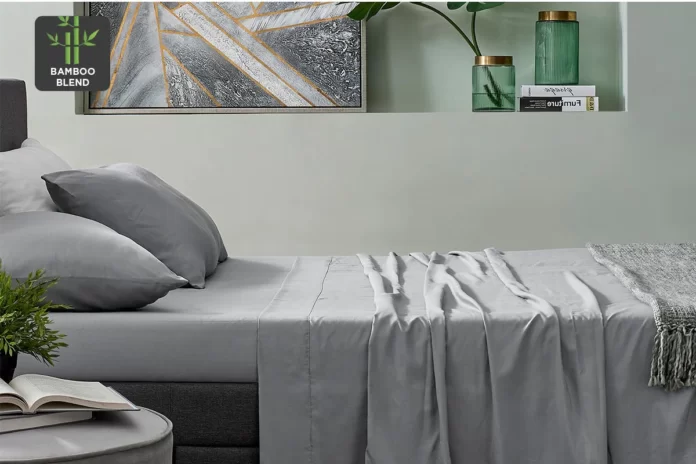Bamboo is an incredibly adaptable plant; with chemical or mechanical processing, it may be transformed into modern flooring, biodegradable plates, and even cloth. The latter method is unusual and produces a linen-like material. Bamboo is most typically chemically treated into a soft, silky, breathable textile. Some people also claim that it is particularly extremely cold.
Types Of Organic Bamboo Sheets:
Table of Contents
Organic bamboo sheets are as smooth as silk but are also temperature regulating which makes them even better. They are highly elevated and well-priced.
It is difficult to determine whether a set of bamboo sheets meets fair labor and environmental standards. With one exception, we’ve only placed sheets here that meet all elements of textile for dangerous compounds in order to assure that the piece is harmless to human health.
Ettitude Bamboo Lyocell Signature Sateen Sheet Set
Ettitude’s organic bamboo sheets are constructed from what the brand calls CleanBamboo, a distinctive bamboo lyocell derived from Forest Stewardship Council-certified forests (FSC). Lyocell is produced in a lower-impact manner than viscose because of the solvent used, which is more recyclable and requires less water. The sheets are sent in recyclable packaging, and the company contributes 1% of its sales to environmental groups.
They are available in a range of sizes and rich, one-of-a-kind colors, which include two patterned designs. The 1000 thread-count sheets are available for thirty days as part of Ettitude’s 30-Night Sleep Trial. Ettitude also sells coordinating bamboo duvet coverings individually.
DTY Luxuriously Soft 100% Bamboo Sheet Set
DTY’s bamboo sheets are available in all normal bed sizes, as well as California king, and a wide range of colors. The all-bamboo sheets have durable elements like double-folded edges and stretch all the way around the bottom sheet for a great match. DTY now sells king and queen-size pillowcases individually for individuals who have many pillows on larger beds. The vendor claims that these sheets are manufactured from organic bamboo, although no organic certification is offered.
Cozy Earth Bamboo Sheet Set
These sheets are only available in white, which is by design given that Cozy Earth claims they are chemical- and organic. According to Cozy Earth, the bamboo utilized is “strictly sourced from USDA-certified organic farms,” and the company communicates with every step of its supply chain. Cozy Earth provides a 100-night trial, free shipping and returns, and a 10-year guarantee against discolor and pilling on these sheets, which are packaged in recyclable products. Along with the sheets, there is a bamboo cover.
Bambpure 100% Organic Bamboo Sheets
These sheets are made entirely of bamboo and have a thread count of 300. They are double for strength and are available in a variety of colors (a range of neutrals plus a couple of vibrant shades). Despite their low price, they have a black satin texture that looks and feels luxurious. This set’s fitted sheet is fully elasticized and designed to suit deep beds up to 16 inches thick, with an extra elasticated strap in the ends to hold the sheet in position.
It is important to note that, like with all sheets, you should read and follow the care recommendations. The vendor claims the bamboo is organic, however, no organic certification is listed.
Cariloha Classic Bamboo Sheets
All Cariloha bamboo items are OEKO-TEX approved and come from the industry’s 10-square-mile bamboo plantation in the hills of China’s Sichuan Province, where no pesticides are used. Classic, Hotel, Resort Percale, and Aloha Soft are the four styles of 100 percent bamboo bedding available from the brand.
Basic is a 230 thread count soft twill sheet available in five colors. The resort is a softer sateen weave that comes in eight different hues. Resort Percale is more structured, has a matte finish, and is only available in white. Cariloha also manufactures a variety of different bamboo bedding products, such as sheets, pillows, and cushions.
Final Verdict:
From a sustainability standpoint, bamboo can be a more environmentally responsible option, but it isn’t necessarily. While bamboo is a fast-growing plant that does not require fertilisers or pesticide residues, the chemical reaction it goes through to become viscose (aka rayon) can be more or less water-wasteful and toxic depending on the chemicals used—and, as with any manufacturing process, the workers may or may not be compensated fairly.


